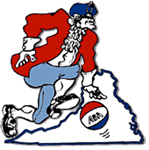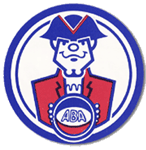Virginia Squires

Historical Moments:
1970/71: After moving south to Virginia, the newly renamed Squires were forced to part with star Rick Barry, who made disparaging comments about the south in Sports Illustrated. Squires traded Barry to the New York Nets for a draft pick and $200,000. The Squires also dealt Warren Jabali to the Kentucky Colonels for a first-round draft pick and cash. To replace Barry and Jabali, the Squires signed Charlie Scott, Neil Johnson, George Irvine, and Ray Scott. Much like the Carolina Cougars and Miami Floridians, the Virginia Squires, coached by Al Bianchi was a regional team based in Norfolk, but also playing games in Richmond, Roanoke, and Hampton Roads. The Squires’ first season would get off to a good start as they beat the Pittsburgh Condors 133-116 at the Old Dominion Fieldhouse in Norfolk. The Squires would win their first six games as they led the Eastern Division from the start of the season, as Al Bianchi was named Coach of the Year, leading his team to a record of 55-29. Leading the team on the floor was Charlie Scott, who was named Rookie of the Year as he averaged 27.1 ppg, along with 5.2 rpg and 5.6 apg. In the playoffs, the Squires would take on the Rick Barry led New York Nets, winning the first two games at home. After losing Game 3 and 4 in New York, the Squires regained control of the series with a nail-biting 127-24 win in Virginia. The Squires would go to close out the series in six games. However, in the Eastern Division Finals, the Squires would be stunned by the Kentucky Colonels in six games, whom they beat out by 11 games for the regular season division title.
1971/72: In their second season, the Squires made a big splash in the draft when the selected UMass underclassman Julius Erving. Nicknamed Dr. J. for the way he operated on the court, Erving became an instant fan favorite in Virginia, averaging 27.5 ppg and 14.5 rebounds per game. Meanwhile, it was Charlie Scott who continued to pace the Squires with a league-best 34.6 ppg. However, near the end of the season, the Squires were shaken by the sudden departure of Charlie Scott, who declared his ABA deal void and jumped to the NBA with the Phoenix Suns. Despite the loss of Scott, the Squires managed a successful season, finishing in second place with a record of 45-39. In the playoffs, the Squires would sweep The Floridians in four straight games, setting up a match up with the New York Nets, who were coming off a stunning upset of the Kentucky Colonels. With a trip to the ABA Championship on the line, the Squires and Nets battled back and forth with the home team winning the first six games of the series. However, in Game 7 in Virginia, the Nets defense proved too strong for the Squires as the Nets won the game 94-88.
1972/73: Much like they lost Charlie Scott to the NBA, the Squires witness Julius Erving sign a five year deal with the Atlanta Hawks of the NBA. However, ABA Commissioner Bob Carlson files suit to prevent Erving from jumping to Atlanta, keeping Dr. J in Virginia. Erving would have another strong season, averaging a league-best 31.9 ppg and 12.2 board per game. The Squires were also helped by the addition of another exciting rookie George Gervin, who joined the team late in the season and averaged 14.1 ppg in 30 games. Despite two future Hall of Famers, the Squires struggled and finished in third place with a 42-42 record. In the playoffs, the Squires would make a quick exit losing to the Kentucky Colonels in five games, as they dropped both games at home, including a 115-113 overtime heartbreaker in Game 3. Following the season, the Squires who were struggling financially sold Julius Erving to the New York Nets along with Willie Sojourner for George Carter, the rights to Kermit Washington, and $1 million.
1973/74: After selling Julius Erving to the New York Nets, the Squires would get off to a rough start, losing their first five games. One player who had a strong start was Swen Nater, who was averaging 20.6 ppg and 14.8 rpg. However, just as fans were beginning to lover Nater, the cash strapped Squires traded him to the San Antonio Spurs for a draft pick and $300,000. Nater, who played just 17 games in Virginia, would go on to win Rookie of the Year. The All-Star Game in Norfolk had a damper on it as rumors that George Gervin would soon join Nater in San Antonio were buzzing Virginia. Gervin, who represented the Squires along with Jim Eakins at the All-Star Game, would be sold to the Spurs on the same day the All-Star Game was played for $225,000. ABA Commissioner Mike Storen tried to block the move, saying it was not in the best interest of the league. However, a court ruled that the league could not block the sale. The Squires would finish the year with a record of 28-56. Despite their poor finish, the Squires made the playoffs by finishing in fourth place. Facing the Nets led by Dr. J., the Squires would go down quickly, losing in five games.
1974/75: After seeing star players continually sold, with the Squires getting next to nothing in return, attendance would plummet. The Squires would be further embarrassed as they were sued by Barry Parkhill after the team’s check bounced. Things appeared to be getting better as the Squires are sold to a group headed by Van H. Cunningham, John B. Bernhardt, and Theodore Broecker, and dubbed the New Virginia Squires with brown and orange uniforms. However, after losing so many players, the Parkhill lawsuit, the Squires would struggle on the court as their 15-69 record was the worst in the history of the ABA.
1975/76: The Squires continued to struggle financially as the ABA began to fold like a house of cards. Before the season, they would trade George Irvine and rights to David Thompson to the Denver Nuggets for Mike Green, Jan van Breda Kolff and Mack Calvin. Thompson would have a Hall of Fame career in Denver, winning Rookie of the Year in 1976. Meanwhile, the Squires limped through the entire season, as they had 18 different players come through Virginia, along with five different coaches, as Al Bianchi who had served the franchise since their lone season in Washington was dismissed after the team got off to a 1-6 start. Mack Calvin, who was suffering through a frustrating season filled with injuries, coaches six games, losing every one. He would be followed by Bill Musselman, Jack Ankerson, and Zelmo Beaty. The Squires would once again finish in last place with a 15-68 record. Though they were lucky just to finish the season, as the Baltimore Claws, who just moved from Memphis folded before playing a game, while the Utah Stars and newly redubbed San Diego Sails both sank early in the season, as the sale of advertising banners and a $250,000 loan from a local bank allows Virginia to continue operations after the players voted to reject the team’s plan to defer one-third of their salaries in order to help the financially-troubled franchise. However, with a merger with the NBA looming, the Squires would become the fourth ABA team to fold as they were unable to pay a $75,000 league assessment to be considered for acceptance into the NBA. In the years since the Squires folded, the NBA has never seriously considered placing a team in Virginia, as the Washington Bullets, later called the Washington Wizards claimed territorial rights.
©MMXX Tank Productions. Stats researched by Frank Fleming, all information, and team names are property of the American Basketball Association. This site is not affiliated with the Virginia Squires or the ABA. This site is maintained for research purposes only. All logos used on this page were from Chris Creamer’s Sports Logos Page.
Page created on July 8, 2012. Last updated on April 8, 2020, at 12:10 am ET.



